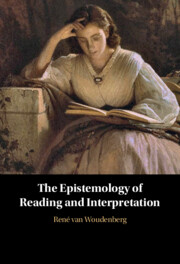Book contents
- The Epistemology of Reading and Interpretation
- The Epistemology of Reading and Interpretation
- Copyright page
- Contents
- Acknowledgments
- Introduction
- Chapter 1 Knowing and Reading
- Chapter 2 Reading and Understanding
- Chapter 3 Sources of Knowledge and Their Individuation
- Chapter 4 Why Reading Doesn’t Reduce Either to Attending to Testimony or to Perception
- Chapter 5 Reading as a Source of Knowledge
- Chapter 6 The Objects of Reading Are the Products of Writing
- Chapter 7 Texts, Meanings, and Interpretation
- Chapter 8 Knowledge through Interpretation (1)
- Chapter 9 Knowledge through Interpretation (2)
- References
- Index
Chapter 6 - The Objects of Reading Are the Products of Writing
Published online by Cambridge University Press: 03 September 2021
- The Epistemology of Reading and Interpretation
- The Epistemology of Reading and Interpretation
- Copyright page
- Contents
- Acknowledgments
- Introduction
- Chapter 1 Knowing and Reading
- Chapter 2 Reading and Understanding
- Chapter 3 Sources of Knowledge and Their Individuation
- Chapter 4 Why Reading Doesn’t Reduce Either to Attending to Testimony or to Perception
- Chapter 5 Reading as a Source of Knowledge
- Chapter 6 The Objects of Reading Are the Products of Writing
- Chapter 7 Texts, Meanings, and Interpretation
- Chapter 8 Knowledge through Interpretation (1)
- Chapter 9 Knowledge through Interpretation (2)
- References
- Index
Summary
This chapter discusses the commonalities and differences between reading and listening by focusing on the commonalities and differences between writing and speaking. Common to writing and speaking is that they are both activities that normally have a fourfold intentionality: (1) they are performed intentionally; (2) they are targeted at other people; (3) they are about things; and (4) they are the means by which the author intends to reach certain aims. Next, I discuss Paul Ricoeur's views on the distinction between writing and speaking, in which the notion of autonomy plays an important role. It is argued that Ricoeur is not successful in bringing out the distinction that he is groping for and that a more adequate view on the distinction should make use of the idea that at least some writing is creative‐investigative – that is, some writing is such that an author would not and even could not have formed the thoughts and ideas expressed in their text if they had not engaged in writing.
Keywords
- Type
- Chapter
- Information
- The Epistemology of Reading and Interpretation , pp. 135 - 160Publisher: Cambridge University PressPrint publication year: 2021

